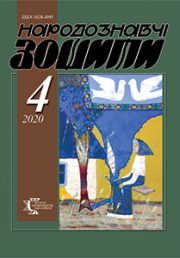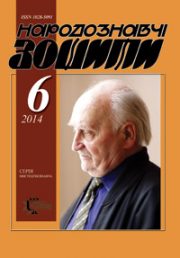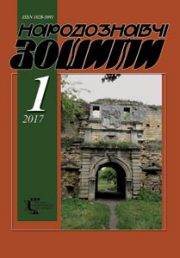The Ethnology Notebooks. 2024. № 3 (177), 692—698
UDK 821.161.2.09ДенисюкІ.
DOI https://doi.org/10.15407/nz2024.03.692
A LITERARY RETROSPECTIVE OF IVAN DENYSIUK: DETECTIVE SEARCH FOR A SUICIDE DIARY
ONІSHECHKO Khrystyna
ORCID ID: https://orcid.org/0009-0003-9770-6332
Postgraduate Student,
Ivan Franko National University of Lviv,
Department of Ukrainian Literature named after academic Mykhailo Vozniak,
1, Universytetska Str., 79000, Lviv, Ukraine,
Contacts: e-mail: onishechkokhrystyna@gmail.com
Abstract. The article discusses in detail the history and historiography of the research aimed at discovering the diary of Mr. Suprun, a teacher from the village of Strilky in Galicia. The life story of this teacher and his tragic fate probably served as a direct stimulus for Ivan Franko to write his famous lyrical drama «The Faded Leaves» (1896). Particular attention is paid to the analysis of the reception of the prefaces of the collection, which have become the subject of lively debate in literary circles. In addition, the article describes the prerequisites for the emergence of decadence and its most prominent features on the example of representatives of the French and Ukrainian modern movement, examines their main ideas and features. This comprehensive approach allows us to better understand the cultural and historical context of the era, as well as to determine the impact of these phenomena on literary and cultural processes.
The purpose of the study is to evaluate the literary discovery made by Ivan Denysyuk thanks to his scientific erudition. The object of the study is the suicide diary, and the subject is the search and thorough analysis of the notebook in the scientific heritage of I. Denysyuk, who denied the mystification of Mr. Suprun’s diary. The task of the article is to review the Lviv scholar’s research on the found «scrapbook». Since the history of I. Denysyuk’s search for a suicide diary has not yet been covered in literary studies, nor has the key images and events that reflect real cases from the biography of Ulyana Kravchenko and the suicide notebook been analyzed in specific works of art, the relevance of the article is quite obvious.
Thanks to I. Denysyuk’s anticipation, in the late 1980s, Mr. Suprun’s «stained binder» was discovered. This testifies to the high methodological level of I. Denysyuk, who systematically analyzed and interpreted the found diary in accordance with scientific standards. I. Denysiuk’s analytical approach was characterized by a deep focus on details and a deep understanding of the context, which contributed to the scientist’s credibility in academic circles. In addition, this case demonstrates the importance of scientific research and the contribution of a scientist to scientific progress, as the discovery of Mr. Suprun’s notebook has provided new perspectives for further research in the field of literary studies and history.
The methodological basis of the article is based on descriptive, biographical and hermeneutical methods.
Keywords: Ivan Denysyuk, Ulyana Kravchenko, decadence, suicide diary, collection «The Faded Leaves», cult of beauty, pessimism, individualism.
Received 9.04.2024
REFERENCES
- Baudelaire, S., & Benjamin, V. (2017). The Parisian split. Essay. Kyiv: Komubuk [in Ukrainian].
- Kotsiubynskyi, M. (1975). Works: in 7 vol. (Vol. 4). Kyiv: Naukova dumka [in Ukrainian].
- Franko, I. (1896). The withered leaf. A lyrical drama. Lviv: Printed by the author, from the printing house of the Institute Stavropigiiskyi [in Ukrainian].
- Shchurat, V. (2001). Dr. Ivan Franko. Franko studies (Issue 1). Drohobych: Vymir [in Ukrainian].
- Denysiuk, I. (2007). Meditations on the crossroads of the crowded «Faded Leaves». Studies of Ivan Franko’s lyrical drama «Faded Leaves». Lviv: Ivan Franko National University of Lviv Publishing Centre [in Ukrainian].
- Korniychuk, V. (2007). «What kind of a decadent am I? (Vasyl Shchurat and the poetry of «Faded Leaves»). «Like organs in a majestic temple…»: Contexts and Intertexts of Ivan Franko (comparative studies) (Issue 8). Lviv: Ivan Franko National University of Lviv Publishing house [in Ukrainian].
- Gundorova, T. (2007). Literariness and poetic gnosis (Ivan Franko’s «Faded Leaves»). Ivan Franko. Faded Leaves: Texts, Materials, Studies. Lviv [in Ukrainian].
- Franko, I. (1976—1986). Letter to Vasyl Lukych. Collected works: in 50 vol. (Vol. 50). Kyiv: Naukova dumka [in Ukrainian].
- Franko, I. (1922). Faded leaves: A lyrical drama. Kyiv: From the printing house of the NTSh [in Ukrainian].
- Skupeiko, L. (2015). «Uneven Tempo and Complete Randomness» (from the History of French Studies 1880—1940). Word and Time, 12, 29—41 [in Ukrainian].
- Kravchenko, U. (1936). Memoirs of a teacher. Kolomyia: Published by Zag. Book Collection [in Ukrainian].
- Denysiuk, I. (2005). Literary and folklore works: in 3 vol., 4 books (Vol. 1, book 2). Lviv: Ivan Franko National University of Lviv [in Ukrainian].
- Kravchenko, U. (1958). Selected works. Kyiv: Goslitvydav USSR [in Ukrainian].
- Korniychuk, V. (2006). Genre mosaic of «Faded Leaves». Ukrainian Literature Studies: Collection of scientific papers (Issue 68, pp. 51—63). Lviv [in Ukrainian].
- Denysiuk, I., & Korniychuk, V. (1990). Unknown materials to the history of Ivan Franko’s lyrical drama «Faded Leaves». Notes of the NTSh. Works of the philological section (Vol. 221). Lviv [in Ukrainian].
- Denysiuk, I., & Korniichuk, V. (1990). Double Circle of Secrets. New materials to the history of the «Faded Leaves». Dzvin, 8, 126—133[in Ukrainian].
- Korniychuk, V. (2017). «Half-light writing on white cards of lyrical drama… » (echo of the suicide diary in the life and work of Ulyana Kravchenko and Ivan Franko). Kyiv Polonist Studies: Ivan Franko and Polish Culture (Vol. XXIX, pp. 270—279). Kyiv: University of Ukraine [in Ukrainian].
- Tykholoz, B. (2004). Eros versus Thanatos (the philosophical code of The Withered Leaves). Lviv: Ivan Franko National University of Lviv Publishing Centre [in Ukrainian].






